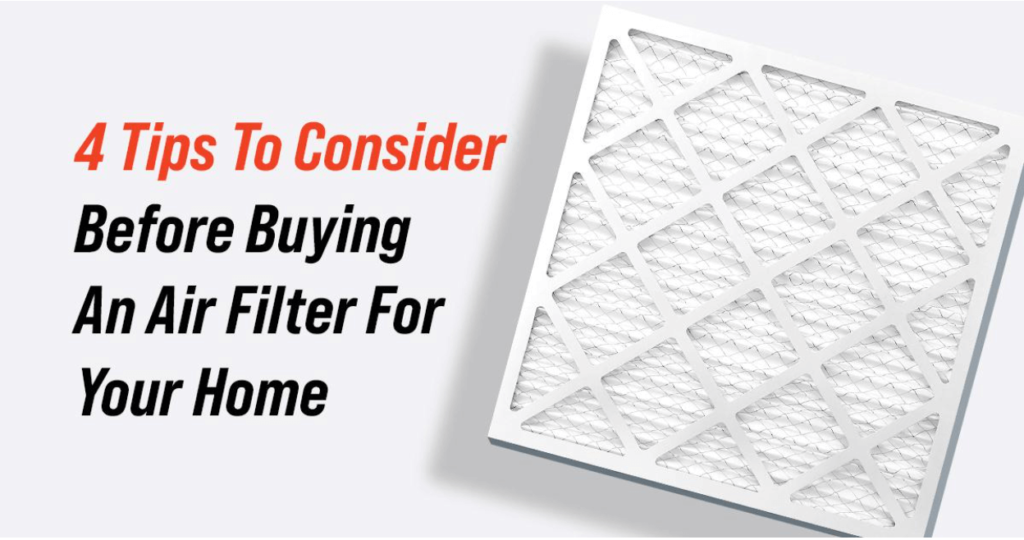Before going to a residential air filter supplier, there are factors to consider that you must know of. A wrong decision can harm your air quality and will eventually cost you more. Here is a guide that will spare you time and energy when you want to buy a custom air filter for your home. Just in case you don’t know how air filters work, here’s a little something to help you first:
How Air Filters Work
Spun fibreglass material or pleated paper/cloth are the most common materials used to make air filters. The material is wrapped in a cardboard frame and cut into various sizes to fit all of the different HVAC systems available. The primary purpose of the filter is to capture and hold all types of particles and impurities in the air that circulates through your HVAC system. When air is dispersed, it is “sucked” back into the HVAC system, where it is conditioned before being used again. Air is pumped through the air filter during this procedure. The particles and pollutants are trapped and removed from the air by spun fibreglass or pleated paper/cloth. These particles can no longer be recirculated back into the atmosphere.
Buying An Air Filter For Your Home
After taking into account the structure of your home, the number of people living in it and your respiratory needs (if you have any disorder), consider these:
1. Filter Size
You will never get the full benefit of your system and filter unless you have the right size residential air filter. Simply check the label on your existing filter for the necessary specifications, or take your measurements. Residential air filters are typically 1 inch thick, however, there are a variety of standard width and height measurements, and some systems have bigger filters.
2. Filter Efficiency and MERV Ratings
There are lower-end, mid-level, and high-end options available, as with practically all things we buy. Not all air filters are created equal when it comes to cleaning your air. More impurities will be eliminated from your indoor air as the quality improves. Keep in mind that higher-quality air filters are more expensive.
This is when the MERV rating of the filter comes into play. MERV stands for “Minimum Efficiency Reporting Value.” It is a numerical value used to rate and compare the efficiency and performance of the filter. MERV ratings normally range from 1 to 16, with the number indicating how well the filter removes particles from the air. The higher the MERV rating, the better the filtration.
- MERV 1-4 Filters: Common standard filters. Filtration basics. Low cost.
- MERV 6–8: Effective filtering for home use. Made of pleated paper or cloth.
- MERV 9-12: High-efficiency filters with good quality. Can catch particles as small as 1 micron.
- MERV 13-16: The highest efficiency and best standard filters on the market. Captures particles as small as 0.3 microns or larger.
Filters with MERV values up to 20 are available, but they are heavy and dense, and a normal household HVAC system cannot manage them. In fact, by reducing airflow, they can obstruct it. This affects the efficiency of your heating and cooling systems and may potentially result in equipment damage. Before purchasing and installing a filter with a MERV rating of more than 16, make sure your HVAC system can handle it.
3. Filters Type
There are different kinds of air filters:
- HEPA Filters: provide the best protection against a wide range of airborne particles. They are capable of trapping particles as small as 0.3 microns and 99.97% of airborne particles. Furthermore, they have a MERV value of 17 to 20.
This type of filter isn’t usually suitable for home HVAC systems with sizing and airflow constraints. If you want HEPA filters for your home, you’ll need to hire an HVAC contractor to make the necessary changes.
- Reusable Air Filters: These are washable filters that may be cleaned and reused multiple times. This sort of filter is usually more expensive than disposable filters and has a MERV rating of 1-4. Hence, mould and mildew can grow on reusable air filters.
- Flat-Panelled Fibreglass Filters: These disposable filters are coated with fibreglass and reinforced with a metal grate. They also have a low MERV rating, so it won’t do much for air filtration in your home.
- Pleated Media Filters: These usually have a MERV rating of 5-13. Pleated media filters also come in high-efficiency variants with MERV ratings of 14 to 16. Filters of this type are made to have a larger surface area, which increases their filtration capacity.
4. Air Filter Replacement
When you want to buy an air filter for your home, choose one that is suited to your budget and lifestyle. This is because air filters have to be replaced regularly. Else they will overwork your HVAC system and spike your power bills. Do not buy air filters that would be too expensive to replace. And do not buy ones that would have to be closely monitored like reusable filters if you led a busy life. Once a month, check your air filter; replace them with new air filters from Custom Filters Direct at least every three months.
Conclusion
While these may seem too much to consider and do, we must follow these instructions. Our HVAC systems, electricity bills and indoor air quality depend on us getting our custom air filters right.

